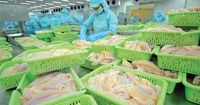In a significant turn of events for Nam Viet Corporation (Navico), the son of the company's CEO has faced a substantial drop in his ownership stake due to margin calls on shares. On May 6, 2025, Doan Chi Thanh, who serves as the Director of Business at Navico and is the son of Doan Toi, the CEO and Vice Chairman, saw 1.64 million shares of ANV sold under a margin call. This sale reduced his ownership from 12.82% to 12.21% of the company's charter capital. This was not the first instance of such a sale; on April 15, 2025, he also had 63,500 shares sold under similar circumstances.
Despite these challenges, the company has shown promising financial results. In its first quarter of 2025, Nam Viet reported a slight increase in revenue from 1,016 billion VND to 1,106 billion VND. More impressively, the after-tax profit surged from 17 billion VND to 132 billion VND, marking the highest profit level since the second quarter of 2022. The company is optimistic about its financial outlook, projecting a profit of 300 billion VND in the first half of the year and around 500 billion VND for the entire year of 2025.
In the midst of these developments, Doan Toi, who is the largest shareholder of Nam Viet, completed the buyback of 3 million shares between April 11 and April 18, 2025, raising his total holdings to 146.6 million shares and increasing his ownership from 53.85% to 54.98%. This strategic move indicates his confidence in the company's future, especially as Nam Viet plans to distribute a cash dividend of 10%, split evenly between 5% for 2024 and 5% for 2025.
Nam Viet Corporation is a leading player in the production and export of catfish, boasting a significant production capacity with 250 hectares of traditional farming areas yielding up to 120,000 tons of raw fish annually, and 600 hectares of high-tech farming areas that have been operational since 2018, contributing an additional 250,000 tons per year. The company has expressed its ambition to maintain robust growth, with expectations of strong demand for its products in the coming months.
In a related development, Vietnamese tilapia is set to return to the Brazilian market following a suspension that lasted over a year. On April 24, 2025, Brazil's Official Gazette published an announcement from the Ministry of Agriculture, Livestock, and Supply (MAPA) stating that the suspension of tilapia imports from Vietnam had been officially revoked. This decision is part of broader negotiations aimed at enhancing trade relations between Vietnam and Brazil, with the goal of achieving $15 billion in bilateral trade by 2030.
The suspension had initially been imposed in February 2024 due to concerns over the risk of Tilapia tilapinevirus (TiLV) infection. During the review period from November 2023 to February 2024, Brazil issued 22 import licenses for tilapia fillets from Vietnam while rejecting two others. The Brazilian government has emphasized that the decision to allow imports is irreversible and will facilitate further negotiations to open up the beef market in Vietnam.
According to MAPA's Import Risk Analysis (ARI) for 2024, the risk of TiLV infection from importing tilapia fillets from Vietnam is negligible due to low exposure. The Brazilian authorities have also updated their health requirements for importing fresh, chilled, frozen, and gutted fish from aquaculture since 2020, ensuring compliance with international standards.
Following the reestablishment of the tilapia market, both countries are expected to continue technical negotiations to fully open Brazil's market to Vietnamese pangasius, with Vietnam reciprocating by allowing the import of Brazilian beef. This trade partnership is anticipated to be mutually beneficial, with both countries looking to expand their agricultural exports.
As the Vietnamese seafood industry navigates these changes, companies like Nam Viet are positioning themselves to capitalize on new opportunities. The reopening of the Brazilian market for tilapia, coupled with the ongoing demand for catfish, underscores the potential for growth in Vietnam's seafood exports. Stakeholders are hopeful that these developments will help balance trade and contribute positively to the overall economy.
Nam Viet's leadership has expressed confidence in the company's ability to meet the challenges ahead. In a recent letter to shareholders, Doan Toi reassured them of the company's strong position in the market, stating, "Please rest assured to hold shares; do not sell at this time. The ANV stock of Vietnam is a very promising stock this year and in the coming years." He emphasized that while the U.S. market is important, it is not the primary focus for Nam Viet, which continues to target markets in China, the Middle East, Brazil, and Mexico.
As the seafood industry continues to evolve, the strategic decisions made by companies like Nam Viet will be crucial in navigating the complexities of international trade and maintaining competitiveness in a global market.




